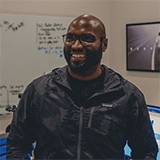
Freelancers have a different relationship with work than most, but few have given it as much thought as Megan Williams, my guest this week. After working in an intense job where she watched coworkers try to one-up each other with stress-related physical ailments, she left to start freelancing as a content marketer.

She met people from all walks of life who were fed up with the ways their jobs were affecting their lives and health.
“We’re all taught to build our lives in a way that secures employment,” she says. “[Where] we go to school, where we live, how we have children, how we structure our families, how we get to interact with extended families, so much of it goes back to the job. That’s the priority.”
But it’s not just particular jobs or industries that promote this idea. In the U.S. and all over the world, the ways we treat employment are harming us.
“Attitudes and culture around employment are not healthy. Our business culture really is founded on slavery. It is rooted in the idea that free and cheap labor should exist for businesses to use,” Megan says. “So that, even though most companies have gotten out of the use of enslaved people to actually do labor, there are still a lot of practices that expect you to sacrifice your life for a job. And sacrifice your quality of life for a job.”
For freelancers, even those who left toxic jobs, this is an even bigger problem. And most people don’t understand the problems they create because of this work-centered culture.
“That’s one reason I really like to talk about our relationship with employment because it dictates so much in our lives and it takes so much work to deprogram,” she says. “I had one client that jokes that he always heard that freelancers work harder than employed people and it’s generally true because we’ve been conditioned to treat ourselves like employers treat us.”
Lately, Megan has been reading articles geared toward employers and how they can treat their employees better. She’s been using these ideas to rethink the ways she treats herself in her work.
“How am I giving myself space to give myself feedback about my work experiences? Am I giving myself enough PTO? Am I micromanaging myself? Are the limitations I’m putting on myself too strict? Am I trying to give myself work-life balance? That kind of thing,” she says. “So, on a practical level, that’s what I’m trying to do more of lately.”
Though she’s improved some of the ways she approaches work, it’s taken a long time and is still a work in progress.
“It’s taken me years. I’m just getting to the point where I can take a day and I’m not calculating in my head, ‘Oh, I could have earned this much today’ or ‘Is this client falling apart,’” she says. “It’s taken me, to treat myself better as an employer to an employee, [years] to undo all those years of conditioning.”
She formed the foundation for this new way of looking at work when she started training in jiu-jitsu. Here, she found a community of people who didn’t define themselves by their work and questioned the dynamic that has become the norm.
“They found ways to push themselves and ways to find aspirations outside of the job. And I really think, looking back, that’s really been foundational for me in finding a different way to define myself, by something outside my job. And questioning that cultural dynamic, because there aren’t a lot of spaces you step into that encourage that,” she says. “Very few places you’re going to find where people are questioning whether that way of life is normal or good or okay.”
Since freelancers typically have so much to worry about when it comes to running their own businesses, having the right tools to maintain your work without being consumed by it is essential. Your resources can help you grow and be successful while you enjoy the life you choose.
“For a lot of people, when you get into freelancing, there’s so much to figure out as far as what kind of niche they want to be in, what kind of skills they want to offer,” she says. “Being able to run [your business] yourself, that’s what I love about what you’re doing with the Hectic app.”
You can catch the full story here to discover how you can find and leverage your freelance niche, what Megan is building with Black Freelance, and tips for taking better care of yourself physically when you’re self-employed.
You can connect with Megan on her website or on Twitter at @blackfreelance1. You can also find her on LinkedIn, Medium, and Instagram.
